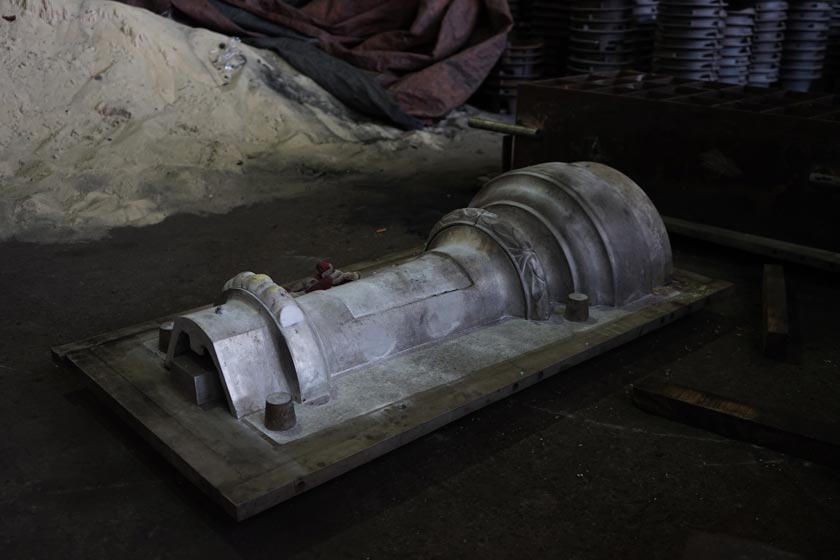Aluminum Foundry Wisconsin is known for excellence in casting
Comprehending the Advantages and Innovations in the Aluminum Foundry Market
The Aluminum Foundry sector plays an important function in modern production. Its lightweight properties significantly enhance gas performance, especially in aerospace and vehicle fields. Additionally, Aluminum's resistance to corrosion guarantees longevity in numerous applications. As the sector evolves, developments such as sophisticated recycling and additive production are improving manufacturing techniques. Checking out these advancements exposes not just the benefits but likewise the obstacles ahead for Aluminum shops in a quickly changing market.
The Lightweight Advantage of Aluminum
Aluminum's light-weight nature provides significant advantages throughout various industries, particularly in production and transport. Its reduced density permits the production of elements that are easier to install and take care of, leading to decreased labor prices and enhanced effectiveness. In the automotive field, lighter lorries add to enhanced gas economic situation and lower exhausts, lining up with worldwide sustainability goals. In aerospace, the usage of Aluminum decreases the total weight of aircraft, which is critical for boosting performance and minimizing operational expenses.
Additionally, Aluminum's lightweight residential properties help with cutting-edge styles that were previously impractical with heavier products. This flexibility makes it possible for makers to produce complex forms and frameworks while keeping architectural integrity. Generally, the lightweight advantage of Aluminum not just enhances product efficiency but likewise drives advancements in modern technology and layout, making it a favored material in various applications.
Deterioration Resistance and Toughness
The Aluminum Foundry market is renowned for generating materials with exceptional rust resistance, making them ideal for different applications. This home, integrated with boosted architectural integrity, adds to the lasting performance benefits that Aluminum elements use. Therefore, sectors significantly depend on Aluminum to meet demanding environmental conditions without jeopardizing quality.
Superior Rust Resistance
While various steels deal with significant difficulties from environmental elements, Aluminum sticks out for its premium corrosion resistance, making it a recommended choice in numerous applications. This building is primarily as a result of an all-natural oxide layer that bases on the Aluminum surface area, supplying an obstacle against moisture and corrosive representatives. Unlike other metals that might rust or degrade with time, Aluminum keeps its stability even in severe atmospheres, such as coastal areas or industrial settings. Additionally, its lightweight nature incorporated with deterioration resistance makes it ideal for applications in aerospace, auto, and marine sectors. On the whole, Aluminum's extraordinary longevity not only improves item durability but additionally lowers upkeep expenses, presenting an engaging advantage for consumers and suppliers alike.
Boosted Structural Honesty
Engineers and developers increasingly identify the value of enhanced structural honesty in contemporary applications, where both deterioration resistance and longevity are critical. Aluminum alloys, understood for their light-weight residential or commercial properties, additionally exhibit phenomenal resistance to corrosion, making them appropriate for rough environments. The cutting-edge techniques employed in the Aluminum Foundry market add significantly to generating components with enhanced durability. Advanced casting procedures and alloy make-ups are tailored to meet details performance requirements, ensuring that structures can stand up to severe conditions without jeopardizing honesty. Furthermore, surface area therapies and coverings boost the lifespan of Aluminum items, further reducing degeneration with time. This concentrate on enhanced architectural honesty not just expands the use of materials but also decreases upkeep expenses, strengthening Aluminum's placement as a product of selection in numerous sectors.
Long-lasting Performance Benefits
Long-lasting performance in Aluminum components is largely credited to their premium deterioration resistance and durability. Unlike many steels, Aluminum normally develops a protective oxide layer, which protects against corrosion and degeneration in different atmospheres, including aquatic and commercial setups. This intrinsic property substantially prolongs the lifespan of Aluminum items, lessening maintenance and substitute expenses. Furthermore, the light-weight nature of Aluminum improves its applicability across industries without compromising toughness. The material's resistance to put on and tear likewise contributes to its dependability popular applications, making it an optimal choice for auto, aerospace, and building and construction industries. As industries increasingly prioritize sustainability and longevity, Aluminum's efficiency advantages line up with modern design needs, solidifying its function in innovative production processes.
Ecological Impact and Sustainability
 As the Aluminum Foundry market advances, it increasingly focuses on ecological impact and sustainability, acknowledging the demand for responsible practices when faced with environment adjustment. Initiatives to minimize waste and energy usage go to the why not try these out center, with many foundries adopting recycling efforts to recover Aluminum scrap. This not just minimizes raw product use yet also notably lowers power expense, as recycled Aluminum calls for only a fraction of the power compared to main manufacturing.
As the Aluminum Foundry market advances, it increasingly focuses on ecological impact and sustainability, acknowledging the demand for responsible practices when faced with environment adjustment. Initiatives to minimize waste and energy usage go to the why not try these out center, with many foundries adopting recycling efforts to recover Aluminum scrap. This not just minimizes raw product use yet also notably lowers power expense, as recycled Aluminum calls for only a fraction of the power compared to main manufacturing.Improvements in discharges manage innovations are being carried out to reduce air contaminants, aligning operations with more stringent ecological guidelines. Factories are also exploring alternative power resources, such as solar and wind, to power their facilities sustainably. By fostering cooperation with stakeholders, the industry intends to create ingenious services that enhance ecological stewardship. Jointly, these efforts highlight a commitment to reducing the Aluminum Foundry's carbon impact while advertising a circular economy within the manufacturing sector.
Advanced Production Techniques
 Revolutionizing manufacturing procedures, the Aluminum Foundry industry is progressively integrating innovative manufacturing methods to enhance performance and precision. Strategies such as computer numerical control (CNC) machining and additive manufacturing have actually arised as necessary elements in enhancing production process. CNC machining allows for high-precision part fabrication, substantially minimizing product waste and production time. At the same time, additive manufacturing opens up brand-new opportunities for complex geometries and lightweight designs that were previously hard to accomplish.
Revolutionizing manufacturing procedures, the Aluminum Foundry industry is progressively integrating innovative manufacturing methods to enhance performance and precision. Strategies such as computer numerical control (CNC) machining and additive manufacturing have actually arised as necessary elements in enhancing production process. CNC machining allows for high-precision part fabrication, substantially minimizing product waste and production time. At the same time, additive manufacturing opens up brand-new opportunities for complex geometries and lightweight designs that were previously hard to accomplish.In addition, the implementation of automation and robotics in Aluminum foundries enhances procedures, minimizes human error, and boosts employee safety. These modern technologies help with a more responsive production setting, allowing suppliers to adapt promptly to market needs. The assimilation of innovative simulation software better improves the layout and screening phases, leading to exceptional click for info item high quality. Jointly, these techniques not just enhance operational effectiveness but likewise foster technology, placing the Aluminum Foundry market at the leading edge of contemporary production.
Technologies in Reusing Processes
The Aluminum Foundry industry is not only progressing in producing techniques yet is additionally making significant strides in recycling procedures. Innovations are arising to boost the effectiveness of reusing techniques, minimizing energy usage and improving sustainability. Advanced arranging modern technologies, such as automated optical sorting, make it possible for the recognition and separation of Aluminum from other materials with high accuracy. This results in a greater top quality of recycled Aluminum, which is essential for keeping the integrity of the last items.
Closed-loop recycling systems are being applied, allowing manufacturers to recycle Aluminum scrap within their own production procedures. This decreases waste and advertises a round economic situation. Additionally, research study into brand-new recycling techniques, such as hydrometallurgical processes, supplies the potential for recouping Aluminum from complex waste streams. These technologies not only add to decreasing the carbon impact of the Aluminum Foundry market but also boost its financial viability in an increasingly environmentally aware market.
Applications Across Various Industries
Many industries are increasingly acknowledging the convenience and advantages of Aluminum Foundry products, resulting in widespread applications throughout markets such as automotive, building and construction, aerospace, and customer products. In the automotive market, Aluminum spreadings add to light-weight lorry styles, enhancing fuel effectiveness and efficiency. Aerospace suppliers use Aluminum parts for their strength-to-weight proportion, vital for aircraft frameworks and elements.
In building and construction, Aluminum is preferred for its resilience and resistance to rust, making it perfect for window frameworks, roof covering, and structural assistances. Durable goods likewise take advantage of Aluminum Foundry items, as seen in cookware, electronic devices, and product packaging, where light-weight and recyclable products are essential.
The flexibility of Aluminum Foundry techniques permits for elaborate styles and precise requirements, dealing with the varied requirements of these sectors. Because of this, Aluminum Foundry products hop over to here are ending up being integral to modern production processes throughout various sectors.
Future Trends in Aluminum Foundries
As industries continue to develop, Aluminum foundries are positioned to accept a number of vital trends that guarantee to enhance efficiency and sustainability. One famous fad is the boosting adoption of electronic innovations, consisting of automation and expert system, which streamline procedures and enhance quality control. Additionally, the push in the direction of lasting practices is leading factories to buy reusing technologies, significantly minimizing waste and power usage.
 Another arising pattern is the usage of advanced alloys and materials, providing to the expanding need for long lasting and lightweight components across numerous fields (Aluminum Foundry). Moreover, the integration of additive manufacturing strategies is prepared for to change component layout, offering customization and decreasing preparations
Another arising pattern is the usage of advanced alloys and materials, providing to the expanding need for long lasting and lightweight components across numerous fields (Aluminum Foundry). Moreover, the integration of additive manufacturing strategies is prepared for to change component layout, offering customization and decreasing preparationsCollaboration with study institutions is additionally expected to drive development, as foundries look for to create brand-new procedures and materials. Aluminum Foundry. Jointly, these patterns suggest a transformative future for the Aluminum Foundry sector, lining up with wider objectives of sustainability and effectiveness
Frequently Asked Concerns
What Are the Normal Prices Connected With Aluminum Foundry Manufacturing?
The typical prices related to Aluminum Foundry manufacturing consist of resources, labor, power, devices maintenance, and overhead expenses. These aspects jointly affect the overall monetary investment needed for reliable Aluminum casting operations.
How Does Aluminum Contrast to Other Metals in Strength?
Aluminum, while lighter than lots of steels, shows remarkable strength-to-weight proportions. Compared to steel, Aluminum is less strong however offers outstanding deterioration resistance, making it a positive option in applications where weight and resilience are essential.
What Precaution Are in Area in Aluminum Foundries?
Safety steps in Aluminum shops normally consist of compulsory personal safety equipment, air flow systems to control fumes, normal tools maintenance, training programs for employees, and adherence to stringent security policies to reduce risks related to liquified metal handling.
How Is Quality Assurance Managed in Aluminum Casting Processes?
Quality control in Aluminum spreading procedures includes strenuous inspections at numerous phases, including raw material analysis, procedure surveillance, and final item testing. Methods such as analytical procedure control and non-destructive screening guarantee adherence to industry requirements.
What Qualifications Are Essential for Aluminum Foundry Vendors?
The value of qualifications for Aluminum Foundry providers includes ISO 9001 for high quality management, ISO 14001 for ecological management, and industry-specific criteria like ASTM and SAE, making sure conformity, safety and security, and integrity in making procedures.
The Aluminum Foundry market plays an important duty in modern production. The Aluminum Foundry sector is renowned for creating products with exceptional corrosion resistance, making them optimal for different applications. Changing manufacturing procedures, the Aluminum Foundry industry is progressively incorporating advanced manufacturing methods to boost performance and accuracy. The Aluminum Foundry market is not only advancing in producing strategies however is additionally making considerable strides in recycling procedures. As industries continue to progress, Aluminum foundries are poised to embrace several vital trends that guarantee to improve efficiency and sustainability.